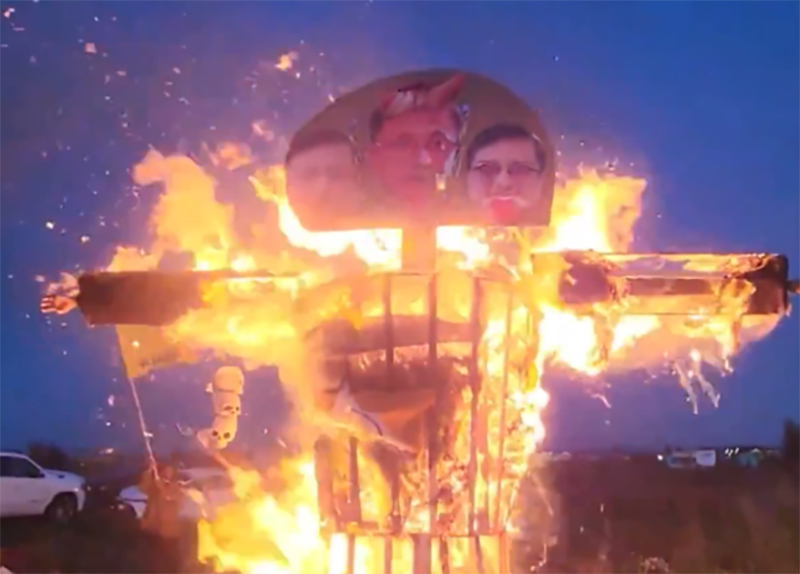 Canada
Canada
Canada’s Double Standards on Violent Protests – A Dangerous Precedent
In recent months, Canada has witnessed a troubling rise in protests that have crossed the line into outright hostility and violence. Most recently, the effigy of Sanjay Kumar Verma, India’s High Commissioner to Canada, was burned by members of the proscribed, extremist Khalistan group Sikhs for Justice in Vancouver.
This act of aggression, carried out under a veil of secrecy, should alarm Canadians and raise important questions about how such behavior is being tolerated by the government and law enforcement.
How is it possible that while the burning of the Indian flag and an international diplomat’s effigy is allowed, acts like Canadian flag burning prompt swift and serious crackdowns from Canadian authorities? The double standard is glaring—and dangerous.
Consider this: when protesters burn a Canadian flag, it is met with swift condemnation and often leads to police intervention. The symbolism of burning a flag is understood as a direct affront to the nation, an act of hostility and disrespect. Yet when effigies of foreign diplomats—representatives of sovereign nations—are set alight in Canadian cities, the response is markedly different.
Why is this being allowed? How is this any less egregious than the burning of the Canadian national symbol?
In the case of the protest targeting India’s High Commissioner, the entire operation was shrouded in secrecy. As reported by journalist Mocha Bezirgan, the burning took place at an undisclosed location, away from public scrutiny and even police knowledge. Multiple police officers and cruisers were stationed at the Indian consulate, unaware that the protestors had taken their violent demonstration elsewhere. How can Canada, as a nation, condone actions that involve targeted aggression, particularly toward a representative of another country?
This is not the first instance of concerning violent protests in Canada, but it may be one of the most consequential. By allowing such protests to go unchecked, Canada risks setting a dangerous precedent—that violent, hateful actions disguised as free speech are permissible so long as they don’t directly target Canadian symbols.
But is it not the responsibility as a democratic and peaceful nation to uphold the dignity of all people and nations, regardless of their nationality?
The hypocrisy is undeniable. In a recent protest where a Canadian flag was burned, the police responded forcefully, sending a message that such acts of hostility towards national identity would not be tolerated. Yet when the effigy of a foreign diplomat is reduced to ashes, it is met with silence. This inconsistency erodes our moral authority and opens the door to more violent, divisive protests in the future.
It is not just a matter of symbolism; it is about the rule of law. Burning effigies and stoking hatred toward foreign diplomats should not be seen as an acceptable form of protest in Canada. The act is not only disrespectful but also dangerous, as it fosters division within our own multicultural society. Sikhs, Hindus, and other groups all coexist within our borders, and violent displays such as these can deepen community tensions, leading to potential clashes that undermine the peace we cherish.
Diplomats are afforded protection under international law for a reason: they are representatives of peace and dialogue, not targets of aggression. Canada, which has prided itself on fostering multicultural harmony and diplomatic ties, cannot afford to look the other way when such violations occur. It is time for the government to step up and address this double standard. If flag burning is unacceptable—and it is—then burning effigies of international diplomats should be equally condemned. Anything less is not only hypocritical but also an affront to the values Canada claims to uphold.
(The opinions expressed in this article are those of the author. They do not purport to reflect the opinions or views of Khalsa Vox or IBNS)
Support Our Journalism
We cannot do without you.. your contribution supports unbiased journalism
IBNS is not driven by any ism- not wokeism, not racism, not skewed secularism, not hyper right-wing or left liberal ideals, nor by any hardline religious beliefs or hyper nationalism. We want to serve you good old objective news, as they are. We do not judge or preach. We let people decide for themselves. We only try to present factual and well-sourced news.






